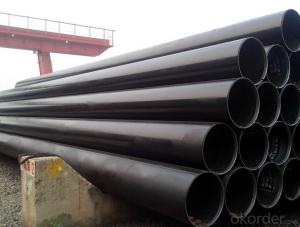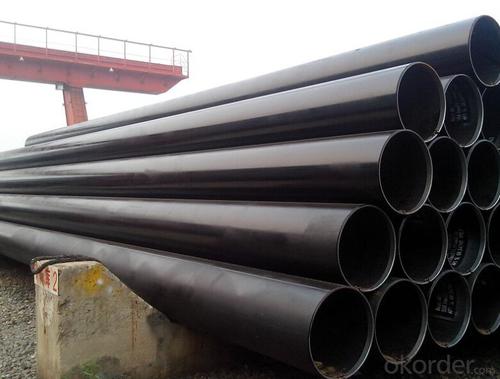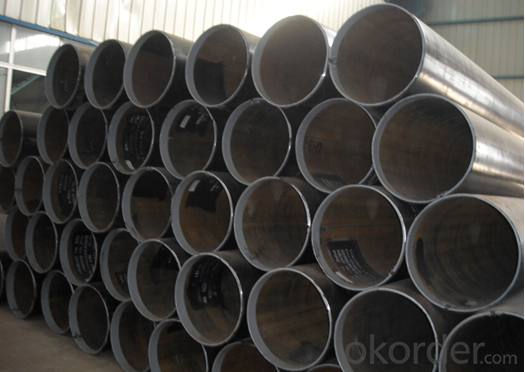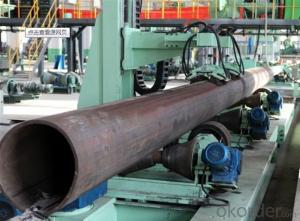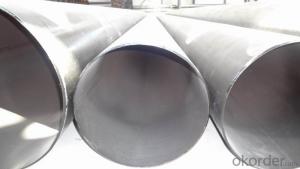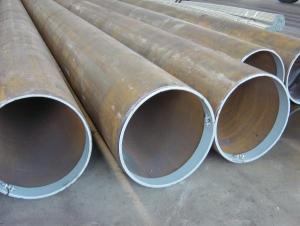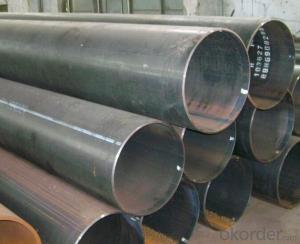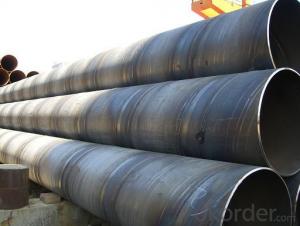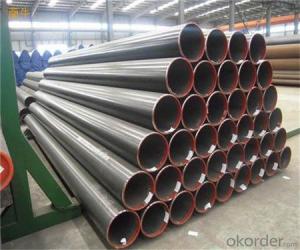API5L CARBON STEEL LSAW PIPE Gr.B,X42-X70 PSL1,X42-X80 PSL2,L245-L555 NB
- Loading Port:
- China Main Port
- Payment Terms:
- TT or LC
- Min Order Qty:
- 25MT m.t.
- Supply Capability:
- 9000MT m.t./month
OKorder Service Pledge
OKorder Financial Service
You Might Also Like
Product Description:
1、Structure of API5L CARBON STEEL LSAW PIPE Gr.B,X42-X70 PSL1,X42-X80 PSL2,L245-L555 NB Description:
LSAW PIPE is formed by drawing a solid billet over a piercing rod to create the hollow shell. As the manufacturing process does not include any welding, seamless pipes are perceived to be stronger and more reliable. Historically seamless pipe was regarded as withstanding pressure better than other types, and was often more easily available than welded pipe.
2、Main Features of the API5L CARBON STEEL LSAW PIPE Gr.B,X42-X70 PSL1,X42-X80 PSL2,L245-L555 NB:
• High manufacturing accuracy
• High strength
• Small inertia resistance
• Strong heat dissipation ability
• Good visual effect
• Reasonable price
3、 API5L CARBON STEEL LSAW PIPE Gr.B,X42-X70 PSL1,X42-X80 PSL2,L245-L555 NB Images:
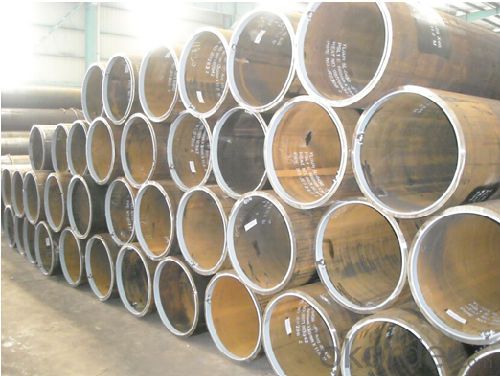
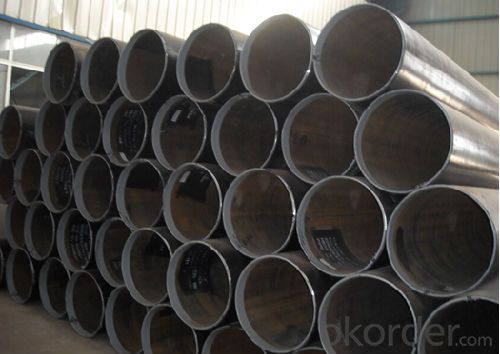
Packaging & Delivery
Packaging Details: | seaworthy package,bundles wrapped with strong steel strip |
Delivery Detail: | 15-30days after received 30%TT |
4、API5L CARBON STEEL LSAW PIPE Gr.B,X42-X70 PSL1,X42-X80 PSL2,L245-L555 NB Specification:
Standard | ASTM, API, ASTM A53-2007, API 5L |
Grade | A53-A369, A53(A,B), A106(B,C), A333 |
Thickness | 8 - 50 mm |
Section Shape | Round |
Outer Diameter | 457 - 1422 mm |
Place of Origin | Jiangsu, China (Mainland) |
Secondary Or Not | Non-secondary |
Application | Hydraulic Pipe |
Technique | LSW |
Certification | API |
Surface Treatment | factory state or painted black |
Special Pipe | API Pipe |
Alloy Or Not | Non-alloy |
Length | 5.8-12M |
Outer Diameter | 457 - 1422 mm |
Grade | A53-A369, A53(A,B), A106(B,C), A333 |
Standard | ASTM, API, ASTM A53-2007, API 5L |
1.Material:20#(ASTM A 106/A53 GRB.API5LGRB,GB),45#,16Mn,10#.
2.Specification range:OD: 457 - 1422 mm,WT: 8 - 50 mm,length:5.8-12m or according to the requirement of clients.
3.Excutive standards:GB,ASME API5L.ASTM A 106/A53,Despite of the above standards,we can also supply seamless steel pipe with standard of DIN,JIS,and so on,and also develop new products according to the requirements of our clients!
4.Surface:black lacquered,varnish coating or galvanized.
5.Ends:Beveled or square cut,plastic capped,painted.
6.Packing:bundles wrapped with strong steel strip,seaworthy packing.
- Q: What are the common sizes of steel pipes?
- The common sizes of steel pipes vary widely, but some common diameters range from 1/8 inch to 36 inches, with wall thicknesses typically ranging from Schedule 10 to Schedule 160.
- Q: What is the standard length of steel pipes?
- The standard length of steel pipes can vary depending on the application and industry, but commonly they are available in lengths of 20 feet or 6 meters.
- Q: What are the standard specifications for steel pipes?
- The standard specifications for steel pipes vary depending on the specific application and industry requirements. However, some common standard specifications for steel pipes include dimensions, material composition, strength, and testing procedures. These standards are set by organizations such as the American Society for Testing and Materials (ASTM), the International Organization for Standardization (ISO), and other national or international bodies. It is important to consult the appropriate standard specifications for specific project needs.
- Q: Are steel pipes suitable for use in automotive industries?
- Yes, steel pipes are suitable for use in automotive industries. They are known for their strength, durability, and resistance to high temperatures and pressure, making them an ideal material for various applications such as exhaust systems, fuel lines, and structural components in automobiles. Steel pipes also offer excellent corrosion resistance, ensuring long-lasting performance in harsh environments.
- Q: How are steel pipes used in the oil and gas pipeline transportation?
- Due to their durability, strength, and resistance to corrosion, steel pipes find extensive use in the oil and gas industry for pipeline transportation. Specifically designed to withstand high pressure and transport various fluids, including crude oil, natural gas, and refined petroleum products, these pipes serve three main purposes in the industry: gathering, transmission, and distribution. Gathering pipelines collect oil and gas from production wells and transport them to processing facilities. Steel pipes are chosen for their ability to endure harsh conditions at extraction sites and effectively transport fluids across long distances. Transmission pipelines, on the other hand, transport oil and gas across vast distances, even spanning countries or continents. Steel pipes are perfect for this task, excelling in handling high pressure and ensuring the efficient flow of fluids over extended distances. To safeguard against external elements and minimize damage risks, these pipes are often buried underground or submerged in water. Distribution pipelines deliver oil and gas to end-users, such as homes, businesses, and industrial facilities. Steel pipes are frequently employed in these pipelines due to their capability to handle varying demand and pressure requirements of different consumers. Though smaller in diameter compared to transmission pipelines, they still provide reliable and safe transportation of oil and gas to their final destinations. Besides their strength and durability, steel pipes used in oil and gas pipeline transportation are coated or lined with different materials to enhance corrosion resistance and reduce the risk of leaks. These protective coatings and linings ensure the pipes' longevity and preserve the integrity of the transported fluids. In summary, steel pipes play a vital role in the oil and gas industry by providing a dependable and efficient means of transporting oil and gas from production sites to processing facilities and ultimately to end-users. Their durability, strength, and resistance to corrosion make them an ideal choice for pipeline transportation in this industry.
- Q: What are the common uses of steel pipes in construction?
- Steel pipes are commonly used in construction for various purposes due to their durability and strength. One of the most common uses of steel pipes in construction is for plumbing systems. Steel pipes are often used to carry water, gas, and other fluids throughout a building. They are preferred over other materials due to their resistance to corrosion and ability to withstand high pressure. Another common use of steel pipes in construction is for structural support. Steel pipes are often used as columns or beams to provide structural integrity to buildings. They can support heavy loads and provide stability to structures, making them a popular choice in the construction industry. Steel pipes are also commonly used in the construction of bridges and highways. They are used for creating strong and durable bridge supports, guardrails, and signposts. Steel pipes are able to withstand extreme weather conditions and heavy traffic, making them a reliable choice for infrastructure projects. Furthermore, steel pipes are used for underground utilities such as sewer and drainage systems. They provide a strong and long-lasting solution for transporting wastewater and preventing leaks. Steel pipes are also used in the construction of underground tunnels and pipelines. In addition to these common uses, steel pipes are also utilized in construction for fencing, scaffolding, and handrails. They are chosen for their strength, versatility, and ability to withstand harsh environmental conditions. Overall, steel pipes are an essential component in construction due to their numerous advantages. Their durability, strength, and resistance to corrosion make them a reliable choice for various applications in the construction industry.
- Q: What are the applications of galvanized steel pipes?
- Galvanized steel pipes have numerous applications in various industries. They are commonly used for plumbing and water supply systems due to their corrosion resistance. Additionally, they are used in gas transmission, oil refineries, and industrial plants where resistance to harsh chemicals and high temperatures is crucial. Galvanized steel pipes are also employed in construction for structural support and scaffolding, as well as for fencing and handrails. Overall, their durability, strength, and cost-effectiveness make galvanized steel pipes suitable for a wide range of applications.
- Q: What are the different standards and specifications for steel pipes?
- There are several standards and specifications for steel pipes, including ASTM A53, ASTM A106, ASTM A333, and API 5L. These standards outline the requirements for the manufacturing, testing, and usage of steel pipes in various industries such as construction, oil and gas, and plumbing. The standards cover aspects like dimensions, mechanical properties, chemical composition, and tolerance levels to ensure the quality and reliability of the steel pipes.
- Q: How do steel pipes perform in marine environments?
- Steel pipes perform well in marine environments due to their high strength, corrosion resistance, and durability. They are able to withstand the harsh conditions of saltwater, waves, and extreme temperatures, making them an ideal choice for various marine applications such as offshore oil and gas drilling, shipbuilding, and coastal infrastructure. Additionally, steel pipes can be coated or galvanized to further enhance their resistance to corrosion, ensuring their long-term performance and reliability in marine environments.
- Q: How are steel pipes used in the renewable energy industry?
- Steel pipes are widely used in the renewable energy industry for various purposes. They are commonly used in the construction of wind turbine towers, where they provide structural support and stability. Steel pipes are also used in the installation of solar panel systems, serving as a reliable conduit for transporting fluids, such as water or heat transfer fluids, within the system. Additionally, steel pipes are utilized in the transportation of renewable energy resources, such as natural gas or hydrogen, as they offer durability and strength to withstand high-pressure conditions.
Send your message to us
API5L CARBON STEEL LSAW PIPE Gr.B,X42-X70 PSL1,X42-X80 PSL2,L245-L555 NB
- Loading Port:
- China Main Port
- Payment Terms:
- TT or LC
- Min Order Qty:
- 25MT m.t.
- Supply Capability:
- 9000MT m.t./month
OKorder Service Pledge
OKorder Financial Service
Similar products
Hot products
Hot Searches
Related keywords
